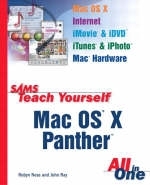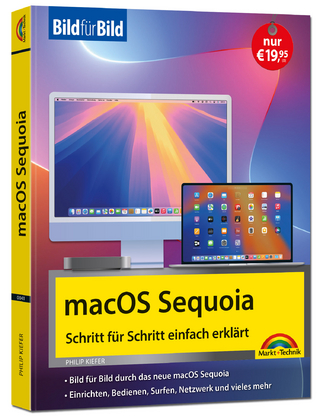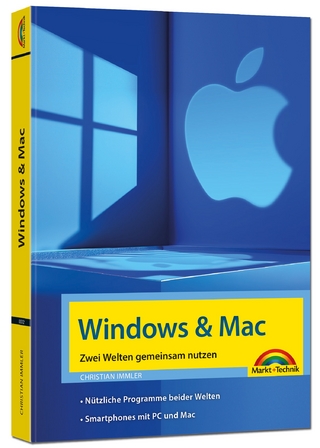
Sams Teach Yourself Mac OS X Panther All In One
Sams Publishing (Verlag)
978-0-672-32603-5 (ISBN)
- Titel ist leider vergriffen;
keine Neuauflage - Artikel merken
Sams Teach Yourself Mac OS X Panther All in One is designed to teach, in one big book, the new Mac user how to easily work with his hardware, his operating system, and all the applications he is likely to want to use to work with digital media. The book does not assume the reader wants to learn how to use just one product, but covers multiple products and technologies together in a logical fashion.
Setting up and configuring Mac hardware.
Understanding the Mac OS X interface.
Burning CDs and DVDs with iDVD.
Playing and organizing MP3s and digital music with iTunes.
Digital photography with iPhoto.
Editing digital video with iMovie.
John Ray is the Director of Engineering/IT Services at Blue Cosmos Design, Inc. An award-winning developer, he provides customized TCP/IP programming solutions to clients nationwide. He has worked on projects for the FCC, the National Regulatory Research Institute, The Ohio State University, Xerox, and the State of Florida, as well as serving as IT Director for Blue Cosmos Design, Inc. He has written or contributed to more than 10 titles currenlty in print, including Special Edition Using TCP/IP, Sams Teach Yourself Dreamweaver UltraDev 4 in 21 Days, and Maximum Linux Security. Robyn Ness holds a masters degree in psychology with a specialization in judgment and decision-making. She currently works as a Web developer for the department of Communications and Technology at The Ohio State University, focusing on issues of usability and content design. John Ray is the Director of Engineering/IT Services at Blue Cosmos Design, Inc. An award-winning developer, he provides customized TCP/IP programming solutions to clients nationwide, including The Ohio State University. In the past three years, he has authored or co-authored several books, including Special Edition Using TCP/IP, and Mac OS X Maximum Security.
Introduction.
I. Mac OS X Basics.
1. Introducing Mac OS X.
Setting Up Mac OS X. A Peek Under the Hood of Mac OS X. Applications Included with Mac OS X. The Mac OS X Desktop. System Preferences.
2. Using the Finder.
The Finder Window. The File System. The Sidebar. Performing File and Content Searches. The Finder Menu Bar.
3. Exploring the Dock.
Applications and the Dock. Docked Windows, Files, and Folders. Trash Can. Customizing the Dock. Dock Preference Options.
4. Working with Folders, Files, and Applications.
Folders, Files, and Applications. The Finder Window Action Menu. Getting Info. Additional Tips for Using Applications. Running Classic Applications.
5. Setting System Preferences and Universal Access Options.
Personal System Preferences. Hardware System Preferences. Internet & Network System Preferences. System Preferences. Universal Access.
II. Common Applications.
6. Using Calculator, Stickies, Preview, and TextEdit.
Calculator. Stickies. Preview. TextEdit.
7. Using QuickTime and DVD Player.
QuickTime. DVD Player.
8. Working with Address Book, Keychain Access, iSync, and Ink.
Address Book. Keychain Access. iSync. Ink.
9. Installing Additional Software.
Software Sources. Downloading and Installing Software. Opening Compressed Files with StuffIt Expander. Software Considerations in a Multiuser System. Some Software Suggestions.
10. Using AppleWorks and Keynote.
AppleWorks. Keynote.
III. Internet Applications.
11. Connecting to the Internet.
Creating an Internet Connection. Setting Network Port Priorities and Locations. Using Internet Connect.
12. Using Safari.
The Safari Interface. Web Browsing in Safari. The Safari Menu Bar. Safari Preference Options.
13. Using Sherlock for Internet Searches.
The Internet Channel. The Pictures Channel. The Stocks Channel. The Movies Channel. The Phone Book Channel. The Translation Channel. The AppleCare Channel. Third-Party Channels. The Sherlock Preferences.
14. Exploring the .Mac Membership.
Defining .Mac. Setting up .Mac Service. Using the iDisk. .Mac Screensaver. The .Mac Web Services.
15. Using Mail.
Setting Up Mail. The Mail Interface. Toolbar Options. Mail Preference Options. Mail Menus.
16. Using iChat AV.
Setting Up iChat. The iChat AV Buddy List. Adding Buddies. Instant Messaging. Group Chat Sessions. Using iChat for Audio or Video Chats. Additional iChat Preferences Options and Application Settings. Menus.
17. Using iCal.
The iCal Interface. Adding and Editing Events. To Do Lists. Calendar Publishing and Subscribing. iCal Preference Options. iCal Menus.
IV. Hardware and Related Settings.
18. Working with Monitors and ColorSync.
Configuring Displays. Using the Display Calibrator Assistant. Task: Calibrate Your Display. Introduction to ColorSync. ColorSync Utility.
19. Adding Peripheral Devices.
USB Basics. FireWire Basics. Peripheral Devices. Connecting FireWire and USB Device.
20. Printing, Faxing, and Working with Fonts.
Using the Printer Setup Utility. The Page Setup and Print Windows. Print and Fax Preference Options. Working with Fonts.
V. Apple's iLife Applications.
21. Introducing iLife.
iTunes. iPhoto. iMovie. iDVD. Necessary Tools. Installing the iLife Applications.
22. Using iTunes.
Setting Up iTunes. The iTunes Interface. Visualizer. Adding Song Files. The iTunes Music Store. Burning CDs and Exporting to MP3 Players. Listening to Internet Radio. The iTunes Preference Options. Using Your iPod with iTunes.
23. Using iPhoto.
The iPhoto Interface. Importing Image Files. Organizing Images. Editing Photos. Designing a Photo Book. Sharing Your Photos. The iPhoto Preference Options.
24. Exploring the iMovie Interface.
Basic StagesShoot, Edit, Enhance, Share. The iMovie Interface. iMovie Preferences. Starting a New Project.
25. Working with Video and Clips in iMovie.
Importing Video from a File. Connecting Camcorders. Working with Video. Moving Around in a Clip. Making Basic Edits.
26. Adding Titles, Transitions, and Effects in iMovie.
Titles. Adding Titles. Adjusting Titles. Transitions. Working with Transitions. Effects. Sample EffectBrightness/Contrast. Working with Effects. Making Changes to Effects.
27. Working with iMovie's Clip Viewer.
Adding and Rearranging Clips. Previewing Clips. Enhancing Clips.
28. Working with Still Photos and Sound in iMovie.
Photos and iMovie. Importing into iPhoto. Adding Photos to iMovie. Still Images and Duration. Still Images, Effects, and Transitions. Sound in iMovie. Working with Audio. Other iMovie Audio Sources.
29. Exporting iMovies.
Choosing a Way to Share Your iMovie. Making Videotapes from iMovie. Emailing iMovies. Putting iMovies on the Web. Burning iMovies to CD. Exporting iMovies to iDVD.
30. Exploring the iDVD Interface.
The DVD Creation Revolution. How DVD Video Works. The iDVD Interface. iDVD Capabilities. The iDVD Preference Options.
31. Designing DVDs in iDVD.
Preparing the DVD Project. Importing Files. Customizing DVD Menus. Customizing Menus. DVD Slideshows. DVD-ROM ContentIncluding Computer Files on a DVD.
32. Creating DVDs with iDVD.
DVD Discs. DVD Storage Capacity. Purchasing the Right Blank DVD Discs. Burning Your DVD. Manufactured DVDs.
VI. System Administration and Maintenance.
33. Sharing Your Computer with Multiple Users.
Understanding User Accounts. File Permissions.
34. Creating and Hosting Your Own Website.
Sharing Services. Connecting to Shared Folders. Sharing Your Internet Connection.
35. Securing Your Computer.
Local Security. Network Security.
36. Maintaining Your System.
Automating Software Updates. Backing Up Your Data. Copying Your Hard Drive. Using Backup Software. Activity Monitor.
37. Recovering from Crashes and Other Problems.
Application Unexpectedly Quits. Other System Crashes. Forcing a Restart. Causes of Crashes. Resetting PRAM. Viruses. Restoring the Administrator Password. Fixing Hard Drive Problems. Reinstalling System Software.
VII. Advanced Topics.
38. Using Basic Unix Commands.
Terminal: The Window to the Underworld. Working with Files: Basic Commands. Process Management. Server Administration. Getting Help with Manpages. Other Useful Commands.
39. Introducing AppleScript.
The Script Editor. Scripting Syntax.
40. Exploring the Utilities Folder.
System Tools. Network Tools. Imaging, Font, and MIDI Tools. System Helpers.
Index.
| Erscheint lt. Verlag | 27.11.2003 |
|---|---|
| Verlagsort | Indianapolis |
| Sprache | englisch |
| Maße | 231 x 187 mm |
| Gewicht | 1220 g |
| Themenwelt | Informatik ► Betriebssysteme / Server ► Macintosh / Mac OS X |
| ISBN-10 | 0-672-32603-5 / 0672326035 |
| ISBN-13 | 978-0-672-32603-5 / 9780672326035 |
| Zustand | Neuware |
| Informationen gemäß Produktsicherheitsverordnung (GPSR) | |
| Haben Sie eine Frage zum Produkt? |
aus dem Bereich


